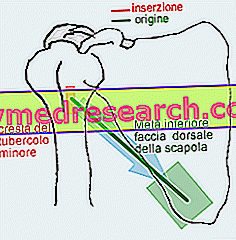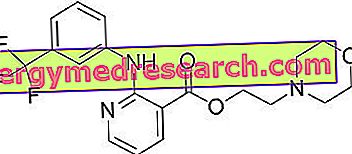Generality
Levofloxacin is a synthetic antibacterial belonging to the class of quinolones.
More in detail, levofloxacin is a fluoroquinolone and has bactericidal activity, ie it is able to kill bacterial cells.

Levofloxacin - Chemical Structure
It is marketed in the form of pharmaceutical formulations suitable for oral, parenteral and ocular administration.
Indications
For what it uses
The use of levofloxacin is indicated for the treatment of:
- Paranasal sinus infections (oral administration);
- Lung infections in patients suffering from pneumonia or suffering from chronic respiratory problems (oral and parenteral administration);
- Infections of the kidneys and urinary tract (oral and parenteral administration);
- Prostate infections (oral and parenteral administration);
- Skin and soft tissue infections (oral and parenteral administration);
- Eye infections (ocular administration).
Warnings
Before starting treatment with levofloxacin orally or parenterally, you must inform your doctor if you are in one of the following conditions:
- If you suffer from epilepsy or other seizure disorders;
- If you have brain damage arising from a stroke;
- If you are suffering from a deficiency of the enzyme glucose-6-phosphate dehydrogenase;
- If you suffer - or have suffered - from psychiatric pathologies;
- If you suffer - or have suffered in the past - from cardiovascular diseases;
- If you have diabetes;
- If you are suffering from myasthenia gravis;
- If you have liver problems.
Should an allergic reaction of any kind occur during treatment with levofloxacin, therapy with the drug should be stopped immediately and the doctor should be contacted immediately.
Contact lenses should not be used during levofloxacin ocular therapy.
Levofloxacin may cause photosensitization reactions, therefore direct exposure to UV rays and sunlight is not recommended.
Levofloxacin can induce undesirable effects that can alter the ability to drive and / or use machinery, so caution should be used.
Interactions
Concomitant administration of oral or parenteral levofloxacin and steroidal anti - inflammatory drugs may increase the risk of tendon rupture.
Before starting treatment with levofloxacin orally or parenterally, you must inform your doctor if you are taking any of the following medications:
- Warfarin or other oral anticoagulants, since there is an increased risk of bleeding;
- Theophylline, used in the treatment of asthma;
- NSAIDs (non-steroidal anti-inflammatory drugs);
- Cyclosporine, an immunosuppressive drug;
- Probenecid, a drug used in the treatment of gout;
- Cimetidine, a drug used to reduce acid secretion of the stomach.
Also, you need to tell your doctor if you are already taking other drugs that can alter your heart rhythm. These drugs include antiarrhythmics, tricyclic antidepressants, macrolides and antipsychotics .
Levofloxacin should not be administered concomitantly with sucralfate, antacids containing aluminum or magnesium or products containing zinc or iron .
Before taking levofloxacin by the eye, you must tell your doctor if you are already using other eye drops or ophthalmic ointments.
In any case - regardless of the route of administration chosen - it is however advisable to inform your doctor if you are taking, or have recently been taken, medicines of any kind, including non-prescription drugs and herbal and / or homeopathic products .
Side effects
Levofloxacin can cause various side effects, although not all patients experience them. This depends on the different sensitivity that each individual has towards the drug. Therefore, it is not said that the adverse effects occur all with the same intensity in each patient.
The main side effects that may occur during treatment with levofloxacin are listed below.
Allergic reactions
Levofloxacin can trigger allergic reactions in sensitive individuals. These reactions can manifest with symptoms, such as:
- Skin eruptions;
- Swelling of the lips, face and tongue;
- Difficulty swallowing;
- Breathing difficulties;
- Anaphylactic shock.
Nervous system disorders
Treatment with levofloxacin may cause:
- Sleep disorders;
- Headache;
- dizziness;
- Tremors;
- Dizziness;
- Drowsiness;
- Alterations or loss of sense of taste and / or smell;
- Loss of appetite;
- Generalized weakness;
- paresthesia;
- Benign intracranial hypertension;
- Dyskinesias and extrapyramidal disorders.
Psychiatric disorders
Levofloxacin therapy may cause:
- Hallucinations;
- Paranoia;
- Psychotic reactions;
- Depression;
- Restlessness;
- Nervousness;
- Anxiety;
- Confusion;
- Abnormal dreams or nightmares.
Blood and lymphatic system disorders
Treatment with levofloxacin may cause:
- Leukopenia, ie the decrease in the number of leukocytes in the bloodstream;
- Neutropenia, ie decrease in the number of neutrophils in the bloodstream;
- Agranulocytosis, ie the decrease in the number of granulocytes in the bloodstream;
- Plateletopenia, or the decrease in the number of platelets in the blood;
- Eosinophilia, that is the increase in the number of eosinophils in the bloodstream;
- Reduced number of red blood cells.
Gastrointestinal disorders
Levofloxacin therapy may promote the onset of:
- Nausea and vomit;
- Diarrhea;
- Dyspepsia;
- Stomach pain;
- Flatulence;
- Constipation;
- Stomatitis.
Skin and subcutaneous tissue disorders
During treatment with levofloxacin, the following may occur:
- Itch;
- Skin eruptions;
- Urticaria;
- Hyperhidrosis;
- Photosensitization reactions.
Hepatobiliary disorders
Levofloxacin therapy may cause increased blood levels of liver enzymes, increased bilirubinemia and hepatitis.
Cardiovascular disorders
Treatment with levofloxacin may cause hypotension, tachycardia, prolongation of the QT interval and cardiac arrest.
Musculoskeletal disorders
Levofloxacin therapy may cause:
- Tendonitis and tendon rupture;
- Muscle weakness;
- Rhabdomyolysis;
- Arthritis;
- arthralgia;
- Myalgia;
- Worsening of the symptoms of myasthenia gravis in patients suffering from it.
Other side effects
Other side effects that may occur during treatment with levofloxacin are:
- Superinfections with bacteria resistant to levofloxacin or fungi;
- Dyspnoea;
- bronchospasm;
- Hypoglycemia or hyperglycemia;
- vasculitis;
- Porphyria attacks in patients who are affected;
- Tinnitus;
- Decrease or loss of hearing;
- Blurred vision;
- Temporary vision loss;
- Changes in renal function;
- Kidney failure;
- Syncope.
Side effects related to the administration of levofloxacin via the eye
In addition to some of the side effects mentioned above, when levofloxacin is administered via the eye, they can occur:
- Pain, irritation, dryness, swelling and / or eye redness;
- Presence of mucus in the eye;
- Ocular inflammation;
- photophobia;
- Itchy eyes;
- Sticky eyelids;
- Rash in the area around the eyes;
- Closed nose or rhinorrhea.
Overdose
In the event of an overdose of oral or parenteral levofloxacin, symptoms may occur, such as:
- Seizure crises;
- dizziness;
- Confusional state;
- Fainting;
- Tremors;
- Cardiac rhythm disorders;
- Nausea;
- Heartburn.
If you suspect you have taken an overdose of levofloxacin, you must immediately tell your doctor.
If you use an excessive amount of levofloxacin by the eye, you must immediately rinse the eye with water and consult your doctor.
Action mechanism
Levofloxacin is a quinolone and, as such, exerts its antimicrobial action by inhibiting two particular bacterial enzymes, DNA gyrase and topoisomerase IV.
DNA gyrase and topoisomerase IV are enzymes involved in the supercoiling, rewinding, cutting and welding processes of the two strands that make up the DNA of the bacterium.
With the inhibition of these two enzymes, the bacterial cell is no longer able to access the information contained within its genes. In doing so, all cellular processes (including replication) are interrupted and the beating dies.
Mode of Use - Posology
Levofloxacin is available for:
- Oral administration in the form of tablets;
- Intravenous administration as a solution for infusion;
- Administration by eye in the form of eye drops.
During levofloxacin therapy, it is essential to strictly adhere to the indications provided by the doctor, both in terms of the amount of drug to be taken and the duration of treatment.
Following are some indications on the doses of levofloxacin usually used in therapy.
Oral administration
In adults, the recommended levofloxacin dose is 250-500 mg once or twice a day.
The amount of drug administered and the duration of treatment must be established by the doctor depending on the type of infection to be treated.
The use of oral levofloxacin in children and adolescents is not indicated.
Intravenous administration
Intravenous levofloxacin should always be administered by a doctor or nurse.
The recommended dose is 250-500 mg of drug administered through an intravenous infusion lasting 30-60 minutes or more.
The amount of levofloxacin administered and the duration of treatment are established by the doctor and vary according to the type of infection that must be treated.
The use of intravenous levofloxacin in children and adolescents is not recommended.
Ocular administration
Ocular levofloxacin can be used in both adults and children.
It is advised to instill one or two drops of eye drops in the affected eye every two hours for the first two days of treatment. In the following days of therapy, the frequency of administration is reduced to four times a day.
The duration of treatment is usually five days.
Pregnancy and breastfeeding
The use of levofloxacin orally or parenterally by pregnant women and by breastfeeding mothers is not recommended.
With regard to levofloxacin administered via the eye, pregnant women and mothers who are breast-feeding must seek medical advice before taking it.
However, in any case, before taking any type of drug, pregnant women and breastfeeding mothers should definitely seek medical advice.
Contraindications
The use of levofloxacin is contraindicated in the following cases:
- In patients with known hypersensitivity to levofloxacin;
- In patients with known hypersensitivity to other quinolones;
- In patients with epilepsy (only when levofloxacin is administered orally or parenterally);
- In patients who have already suffered from tendinopathies following previous treatments with other quinolones (only when levofloxacin is administered orally or parenterally);
- In children and adolescents (only when levofloxacin is administered orally or parenterally);
- In pregnancy and during lactation (only when levofloxacin is administered orally or parenterally).



